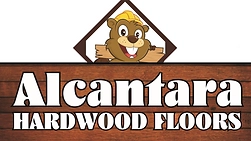Popular Types of Flooring
Whether you're looking for something subtle and elegant or lively and bold, there's a floor for you. Discover the most essential details about each type to guide your decision making.
Hardwood Flooring
The appeal of hardwood floors stands the test of time. With shades including oak, cherry, maple, walnut, and more, it can fit any design without sacrificing durability. However, it's among the priciest of flooring materials and requires significant upkeep. At a minimum, you'll need to use specialty cleaning products regularly and refinish the floor every few years. Since it's susceptible to water damage, it's also not suitable for laundry rooms, bathrooms, or basements.
Engineered Wood Flooring
Engineered wood offers you the look and durability of hardwood without the extra maintenance. Typically, it uses a layer of real hardwood fused with a plywood substrate. While it's more resistant to warping versus true hardwood, it can sound hollow to walk on and can't be refinished more than once.
Laminate Flooring
Laminate is another more affordable flooring option, consisting of a particleboard base, wood or tile finish, and protective plastic coating. It's scratch-resistant, easy to clean, and available in many different colors and styles. However, it's more susceptible to water damage and chipping.
Vinyl Flooring
Vinyl flooring has superior moisture and fading resistance and requires minimal upkeep. Popular options include luxury vinyl tile (LVT) and luxury vinyl plank (LVP), with both having equal durability and long-lasting nature depending on the model you buy. Their price point sits comfortably between wood and laminate.
Tile Flooring
Tile flooring is another timeless-looking, robust option. Like vinyl, it requires minimal maintenance and is simple to clean. As such, it's an ideal choice for areas prone to moisture like bathrooms and kitchens. However, it requires intensive prep work before installation and can be cool and sleek to walk on. Pricing depends on the material you pick, with porcelain being more expensive than ceramic.
Stone Flooring
Stone floors are among the most waterproof available. You can choose from a variety of bold design options, including granite, marble, travertine, and sandstone. Despite its unique flair, it's not easy to clean, and long-term maintenance could be a bit more expensive.
Linoleum Flooring
With proper maintenance, linoleum floors can endure for years. It is a budget-friendly choice with numerous alternatives for adaptation. However, it can readily become damaged and has been known to fade when exposed to direct sunlight. The sun's rays also lead linoleum to fade over time, and it might not work well for damp locations.
Carpet
Carpet is the most affordable flooring option. It can make a space feel more comfortable and is great for absorbing sound. You don’t have to worry about scratches or dents, and the cushioning makes it a safer choice for babies and toddlers. However, the fibrous material easily holds onto moisture, stains, and odors, which isn't ideal for pet owners or allergy sufferers.
How to Choose a Lowell Flooring Company
Choosing a floor covering provider is just as critical as choosing a design. To ensure you get the most value, consider each of the following criteria.
Reputation and Reviews
The most crucial thing to research about any flooring company is its reputation. You can learn more about previous clients' experiences from review sites like Yelp, Google, Trustpilot, and the Better Business Bureau (BBB). Every flooring installer will have a mix of compliments and criticism online. If a company addresses issues in an amicable and satisfactory way, it's generally a good sign. However, if you find more negative reviews than positive ones, it's better to avoid working with it.
Portfolio and References
Most flooring companies keep portfolios of their past projects. We recommend requesting a copy so you can inspect the crew's craftsmanship. Portfolios might also include references from past customers. Don't hesitate to request their contact information so you can discuss their experiences and thoughts about the company.
Specialization and Services
Look for an installer that specializes in the type of flooring you're interested in. For example, a crew might be experienced with carpet but not stone. An installer's service offerings can also make a difference. At the very least, you should choose a provider that offers to haul away your old flooring materials. However, providers can also offer hardwood refinishing or design advisory.
Cost
Cost is vital to consider, but it should be less important than quality in your selection process. We recommend getting multiple different quotes for your flooring job to compare pricing and workmanship. Many companies offer on-site and online estimates to streamline the process.
Warranties and Guarantees
You should look for two different warranties in your company search. A manufacturer's warranty protects you in case of a product defect, while an installer's warranty covers workmanship. While some manufacturers and contractors have lifetime warranties, most are still restricted to a specific time period (often ten years.) If you'd like additional coverage, you might be able to pay extra for an extended warranty.
Estimated Timeline
You don't want your flooring work to last longer than expected. Request an estimated timeline up-front and ask about potential delays. Express your expectations clearly and secure any guarantees in writing.
Ready to Get a Quote on Your Flooring Project?
Please enter a valid 5-digit zip code!
Frequently Asked Questions About Flooring in Lowell
How much will it cost to install a new floor in Lowell?
See our guides to how much each flooring type typically costs:
What's the most popular flooring material in Lowell?
What are the licensing laws for Lowell flooring companies?
Who is the largest flooring manufacturer?
What are the signs it's time to replace my old flooring?
- Uncontrollable mildew or mold growth
- Holes, scratches, or dents
- Increasing space between tiles or planks
- Spots that feel loose or unstable
- Water damage
- Heightened squeakiness
To share feedback or ask a question about this article, send a note to our Reviews Team at reviewsteam@thisoldhousereviews.com.

















